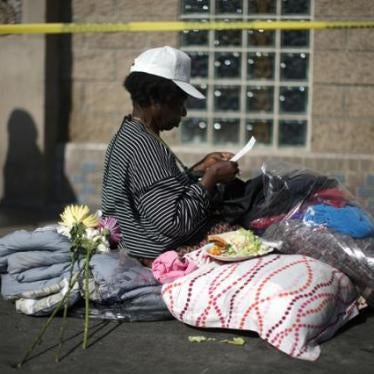(Sacramento) – A newly passed California measure that proponents claim will address the needs of unhoused people is open to abuse and risks failing to provide people with needed housing and services, Human Rights Watch said today. The bill, the Community Assistance Recovery and Empowerment (CARE) Court Program, or SB 1338, allows for involuntary “referral” by family members, police, outreach workers, and agencies that place a person under the jurisdiction of the newly established CARE Court.
The bill aims to target those with schizophrenia spectrum and other psychotic disorders, but because Black and Brown people are frequently over and misdiagnosed with these conditions, it will disproportionately affect them. These same groups are most often denied access to voluntary health care, and due to discrimination in housing, employment, policing, and other factors, make up a greatly disproportionate number of unhoused people.
“The so-called ‘CARE Court’ is not about care at all – it plays on prejudices against people who are unhoused and living with mental health conditions to create a coercive system of court-ordered treatment when we know that involuntary treatment is ineffective and inhumane,” said Olivia Ensign, senior US program advocate at Human Rights Watch. “Instead of pouring millions of dollars into coercive measures that are set up to fail, lawmakers should invest in proven treatment and support programs.”
Governor Gavin Newsom proposed the CARE Court in March 2022. In the face of consistent opposition from a long list of disability, racial justice, peer-led, and other civil and human rights groups, including Human Rights Watch, the California legislature passed the bill in August. The bill now heads to Newsom for his signature.
The involuntary referral to the court can result in an order from a judge, called a CARE plan. That plan may include an order exerting power over fundamental areas of a person’s life, including medication, housing, and other services and support. Failure to obey this CARE plan can result in additional intervention, including possible conservatorship, which can strip a person’s ability to make decisions over their own lives and deny them the right to autonomy over their own health.
The new law will divert resources away from existing behavioral health and housing initiatives, potentially including successful community-based voluntary treatment, housing programs, and other social supports. The CARE Act does not create any new behavioral health or housing resources. Instead, it redirects money already in the budget to programs required by a CARE plan, placing additional pressure on resources that are already in short supply.
“The politicians who have promoted the CARE Court have repeatedly and falsely claimed it provides ‘voluntary’ treatment, when, in fact, the entire system is based on coercion,” Ensign said. “A person’s ability to access critical services and housing should not hinge on court control.”







